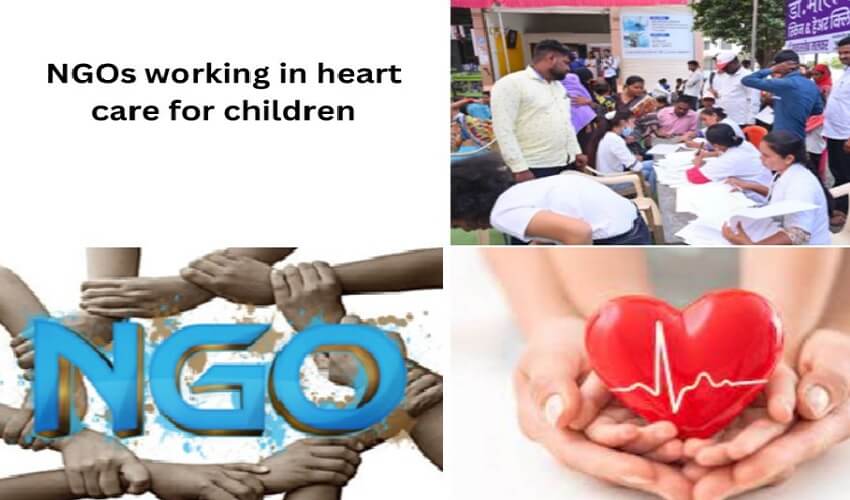
In developing countries, congenital heart defects (CHDs) continue to be one of the leading factors of childhood mortality. Many infants born with CHDs can expect living close to normal lives thanks to advancements in diagnostic tools and treatment options. However, a significant portion of infants with congenital cardiac abnormalities in developing nations lack access to quality healthcare.
Numerous factors contribute to this, including a lack of knowledge that delays diagnosis, a lack of infrastructure for high-quality pediatric cardiac care, and insufficient funding. Children’s Healthcare Foundations and other Non-Governmental Organizations (NGOs) involved in pediatric heart care have been playing an essential role in this field.
Children’s Healthcare Foundations
Work with children who have CHDs have been taking the lead in raising awareness at the grassroot level, supporting families of children with CHDs and directing them to the appropriate facilities and medical professionals, as well as providing financial support. To be able to raise the money necessary to meet these goals, they in turn depend on corporate charity donations, private donations, gifts from foundations, and the support of other strategic partners.
Children’s Healthcare Foundations and other NGOs working in heart care for children have been working in the following areas, especially in developing countries:
Timely Diagnosis
Despite advancements in prenatal screenings, the majority of CHDs are still not identified at this time. Many births still happen at home, despite the fact that the number of institutional deliveries has been rising as a result of the excellent work being done by children’s health care foundations partnering with the government. Even for births that occur in district hospitals, CHD screening is occasionally not done. This is a result of the treating physicians’ and front-line staff members’ insufficient knowledge of recent developments in diagnosis. Children’s Healthcare Foundations have been playing a significant role in this situation by increasing local knowledge among both the local populace and the front-line staff.
Connecting to Pediatric cardiac specialists and centers
Pediatric cardiac centres are still few and far between in medical facilities, particularly in developing nations. The link between families of children with CHD and the appropriate hospitals and pediatric cardiologists who can treat the children has been made possible in large part by representatives of children’s healthcare foundations and NGOs specializing in heart care for children.
Financial Support
A sizable portion of the population in developing nations continues to lack access to treatment for congenital heart abnormalities. There is hardly any medical insurance. A lot of hospitals are working with foundations for pediatric healthcare to raise money to cover the cost of the procedures. NGOs providing pediatric cardiac care also raise money through corporate charity donations and other sources to support families in need.
Follow-ups and emotional support
It’s crucial for kids who have had CHD treatment to have regular follow-ups. Again, children’s healthcare foundations are crucial in this situation because they act as a liaison between the family and the hospitals to make sure that follow-up appointments are made on time and that the child gradually resumes leading a normal life. It is also incredibly challenging emotionally to parent a child with CHDs. When families also struggle financially to pay for their child’s medical care, this problem is exacerbated. The guidance, support, calming of parents’ anxieties and concerns, and counselling provided by children’s healthcare foundations is crucial in helping parents achieve the greatest results for their children.
In the developing countries, children’s healthcare foundations need to play a more proactive role in fighting the burden of diseases such as congenital heart defects. In India there a few NGOS that are working in heart care with children but these are not many. And for all these organizations to do what they are ding they need more support from the community at large, the government, corporate charity donations, foundations and other stakeholders.
References
Saxena A. Status of Pediatric Cardiac Care in Developing Countries. Children (Basel). 2019 Feb 25;6(2):34. doi: 10.3390/children6020034. PMID: 30823591; PMCID: PMC6406635.
Rashid U, Qureshi AU, Hyder SN, Sadiq M. Pattern of congenital heart disease in a developing country tertiary care center: Factors associated with delayed diagnosis. Ann Pediatr Cardiol. 2016 Sep-Dec;9(3):210-5. doi: 10.4103/0974-2069.189125. PMID: 27625517; PMCID: PMC5007928.
Elshazali, O., Ibrahim, M., Elseed, A., 2022, ‘Management of Congenital Heart Disease in Low-Income Countries: The Challenges and the Way Forward’, in P. S. Rao (ed.), Congenital Heart Defects – Recent Advances, IntechOpen, London. 10.5772/intechopen.104830.









Heya i’m for the first time here. I came across this board and I in finding It really helpful & it helped me out a lot.
I hope to present one thing back and aid others such as you aided
me.
What a information of un-ambiguity and preserveness of precious know-how concerning unexpected
emotions.
Very interesting topic, thankyou for putting up. “I do not pretend to know where many ignorant men are sure-that is all that agnosticism means.” by Clarence Darrow.
Hi there very cool blog!! Guy .. Beautiful .. Amazing .. I will bookmark your web site and take the feeds also?KI am glad to seek out a lot of helpful info right here in the post, we want work out more techniques on this regard, thank you for sharing. . . . . .
Lottery Defeater Software is a cutting-edge application designed to analyze and optimize your chances of winning various lottery games.
Wonderful website. Plenty of helpful info here. I am sending it to a few buddies ans additionally sharing in delicious. And naturally, thank you in your sweat!
Today, I went to the beach front with my kids. I found a sea shell and gave it to my 4 year old daughter and said “You can hear the ocean if you put this to your ear.” She placed the shell to her ear and screamed. There was a hermit crab inside and it pinched her ear. She never wants to go back! LoL I know this is totally off topic but I had to tell someone!
We are a group of volunteers and starting a new scheme in our community. Your site offered us with valuable information to work on. You have done an impressive job and our entire community will be thankful to you.
Hi there! I just want to give an enormous thumbs up for the good information you’ve gotten right here on this post. I will likely be coming again to your blog for extra soon.
My brother suggested I may like this website. He was
totally right. This post truly made my day. You can not consider just how a
lot time I had spent for this information! Thanks!
Hey just wanted to give you a quick heads up. The text in your content seem to be running off the screen in Firefox. I’m not sure if this is a formatting issue or something to do with internet browser compatibility but I thought I’d post to let you know. The layout look great though! Hope you get the problem solved soon. Kudos
Fantastic beat ! I would like to apprentice while you amend your web site, how can i subscribe for a blog website? The account aided me a acceptable deal. I had been tiny bit acquainted of this your broadcast offered bright clear idea
Thanks , I have recently been looking for information about this topic for a long time and yours is the best I have came upon till now. But, what in regards to the bottom line? Are you certain concerning the source?
If you are going for most excellent contents like me, simply pay a quick visit this web site all the time as it
provides quality contents, thanks
An attention-grabbing dialogue is price comment. I believe that it’s best to write extra on this matter, it may not be a taboo subject but typically people are not enough to talk on such topics. To the next. Cheers
Hi there! This post couldn’t be written any better! Reading through this post reminds me of my previous room mate! He always kept talking about this. I will forward this article to him. Pretty sure he will have a good read. Thank you for sharing!
What Is Neotonics? Neotonics is a skin and gut supplement made of 500 million units of probiotics and 9 potent natural ingredients to support optimal gut function and provide healthy skin.
mexican rx online: online mexican pharmacy – buying prescription drugs in mexico
best online pharmacies in mexico
http://cmqpharma.com/# mexico pharmacies prescription drugs
medication from mexico pharmacy
Hi my friend! I want to say that this article is amazing, nice written and include approximately all important infos. I’d like to see extra posts like this.
Can I simply say what a reduction to search out somebody who really is aware of what theyre talking about on the internet. You positively know the way to convey a problem to mild and make it important. Extra individuals need to learn this and perceive this aspect of the story. I cant imagine youre not more in style since you positively have the gift.
I like what you guys tend to be up too. This kind of clever work and coverage! Keep up the great works guys I’ve incorporated you guys to my personal blogroll.
What Is LeanBiome? LeanBiome is a natural dietary supplement that promotes healthy weight loss.
Hi there this is somewhat of off topic but I was wanting to know if blogs use WYSIWYG editors or
if you have to manually code with HTML. I’m starting a blog soon but have no
coding skills so I wanted to get guidance from someone with experience.
Any help would be enormously appreciated!
Thank you for sharing excellent informations. Your web-site is so cool. I’m impressed by the details that you have on this website. It reveals how nicely you understand this subject. Bookmarked this website page, will come back for extra articles. You, my pal, ROCK! I found just the info I already searched all over the place and simply couldn’t come across. What a perfect web site.
I don’t think the title of your article matches the content lol. Just kidding, mainly because I had some doubts after reading the article.
reputable indian online pharmacy: buy medicines online in india – online pharmacy india
pharmacy rx world canada my canadian pharmacy rx legitimate canadian pharmacy
canadian pharmacy india: canadianpharmacyworld – canadianpharmacyworld
https://foruspharma.com/# mexican drugstore online
mexican drugstore online: mexican online pharmacies prescription drugs – buying from online mexican pharmacy
canadian pharmacy ratings canadian drug pharmacy canadian pharmacy review
india pharmacy mail order: п»їlegitimate online pharmacies india – top 10 online pharmacy in india
indian pharmacies safe: world pharmacy india – indian pharmacy
http://indiapharmast.com/# indian pharmacy paypal
Some times its a pain in the ass to read what people wrote but this site is rattling user friendly! .
pharmacies in mexico that ship to usa: mexican mail order pharmacies – mexican mail order pharmacies
reputable indian online pharmacy india online pharmacy best online pharmacy india
best canadian pharmacy online: canadian 24 hour pharmacy – reddit canadian pharmacy
india pharmacy: india pharmacy mail order – reputable indian pharmacies
online shopping pharmacy india: buy medicines online in india – top 10 pharmacies in india
http://foruspharma.com/# mexican pharmaceuticals online
best rated canadian pharmacy: safe reliable canadian pharmacy – canadian pharmacy no scripts
Online medicine order: indian pharmacy online – indianpharmacy com
https://amoxildelivery.pro/# how to buy amoxicillin online
http://clomiddelivery.pro/# how to get clomid without rx
This information is priceless. Where can I find out more?
https://doxycyclinedelivery.pro/# can i purchase doxycycline over the counter
very good submit, i certainly love this website, keep on it
An excellent platform! The user-friendly interface and rich variety of content make it my favorite.
http://clomiddelivery.pro/# where to buy generic clomid without prescription
https://ciprodelivery.pro/# cipro
A fantastic resource! The content is both informative and entertaining. I definitely recommend it.
It’s great to come across a site that does its job so well. Congratulations and best wishes!
http://doxycyclinedelivery.pro/# doxycycline 100mg tabs
http://ciprodelivery.pro/# buy cipro online
Excellent blog here! Also your site loads up very fast! What host are you using? Can I get your affiliate link to your host? I wish my web site loaded up as fast as yours lol
This site is truly addictive! Always filled with current and interesting content.
https://doxycyclinedelivery.pro/# buy doxycycline us
Her ziyaretimde yeni bir �ey ��reniyorum. ��erikler �ok �zenli ve profesyonelce haz�rlanm��.
مزاج , شيشةمزاج هو علامة تجارية تتخصص في صناعة وتوريد الشيشة ومستلزماتها. تتميز علامة التجارية بتصميماتها المبتكرة والعصرية، وجودة منتجاتها العالية، وتجربة العملاء
İnanılmaz derecede bilgilendirici ve eğlenceli bir site. Herkese tavsiye ederim!escort pendik